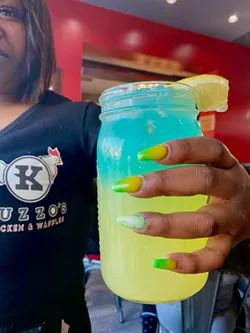
David Rudolph PR
A cocktail from Kuzzo's Chicken & Waffles.
Democrat Sens. Jeff Irwin of Ann Arbor and Mallory McMorrow of Royal Oak introduced legislation to designate public alcohol consumption areas and allow bars and restaurants to deliver alcohol.
Irwin sponsored Senate Bill 939, aiming to allow local municipalities to approve certain “social districts in which customers can purchase alcohol in containers that prominently displays the businesses’ name or logo and drink it within that area."
Under the bill, a social district permit would cost $300 for a company with an on-premise liquor license.
Irwin told The Center Square the legislation would grant local governments the ability to throw a lifeline to Michiganders favorite struggling businesses.
“I want our restaurants and bars to use every tool to survive this crisis,” Irwin said in a statement. “Allowing communities more flexibility to make local rules for beer and alcohol allows communities to reflect their values and their local public safety needs.
“I think it would facilitate festivals and downtown events that currently have to follow pretty strict rules about how they operate a beer tent or on-site temporary liquor license,” he said.
McMorrow sponsored Senate Bill 938 to allow bars and restaurants to sell cocktails to-go via curbside or delivery if the recipient verifies their legal age and signs for pickup or delivery.
“Restaurants typically make up to a third of their revenue from alcohol sales, and this bill will open up a critical tool to help our local bars and restaurants survive the long road ahead,” McMorrow said in a statement. “Residents could enjoy their favorite drink with their meal from the comfort of home, while restaurants and bars could increase their cash flow and, most importantly, keep staff employed.”
McMorrow said in a video that many bars and restaurants are projecting a 12- to 18-month recovery period assuming there isn’t a second wave of COVID-19.
State Rep. Michael Webber, R-Rochester Hills, filed similar legislation, which aims to let local governments create and revoke “social districts” for public drinking areas.
Webber pointed to Toledo, Ohio, as a successful social district.
The Toledo Blade reported parts of Toledo had allowed outdoor drinking areas since 2015, and the Downtown Outdoor Refreshment Area includes 24 establishments.
“Outdoor drinking districts are not a new concept, and they have been proven to be effective — even prior to COVID-19,” Webber said in a statement. “As Michigan looks to slowly reopen various industries, this is a common-sense solution we need to explore. It could prove very beneficial to our local downtown areas.”
Whitmer shut down in-person dining at bars and restaurants on March 16 in response to COVID-19, although she reopened them at half capacity in parts of Upper Michigan starting Friday.
So many restaurants, so little time. Sign up for our weekly food newsletter delivered every Friday morning for the latest Detroit dining news.

